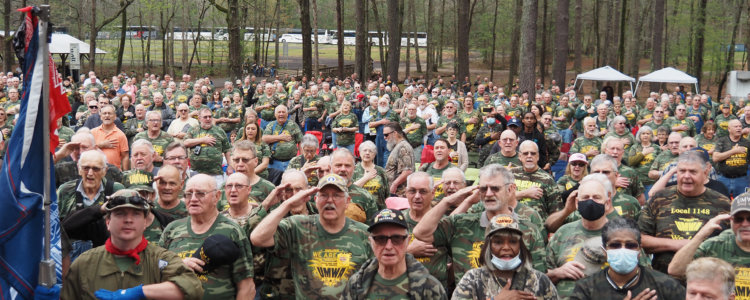
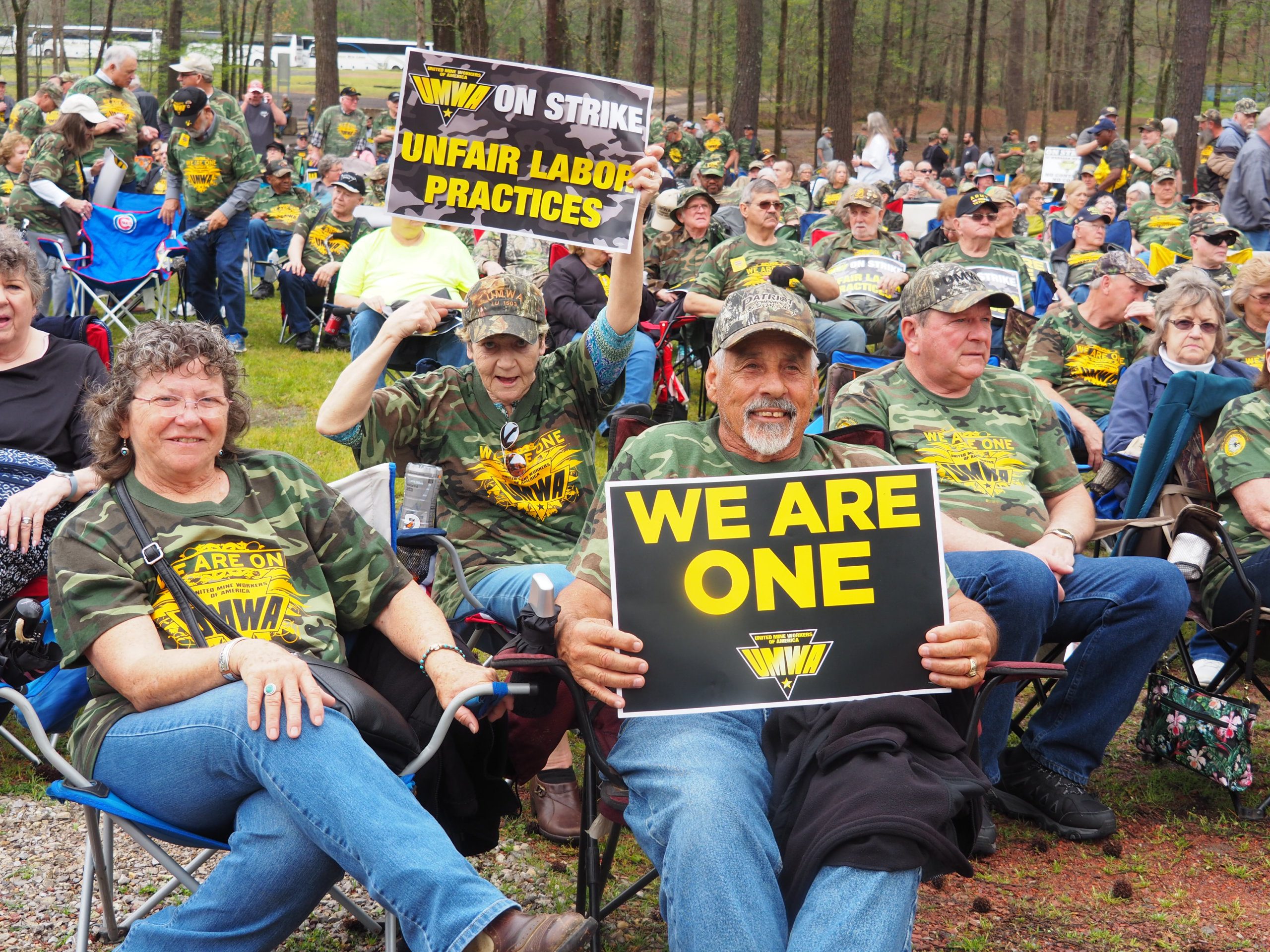
By the time I arrived at Tannehill State Park that morning, I was fully prepared to spend my day stuck in the mud impersonating a drowned rat. I was not surprised to see that the day’s schedule had been moved up in a bid to outrun the rain. The original start time was slated for 11AM, but the rally was already in full swing by 10:30AM. Like all UMWA rallies, this one opened with a prayer, and I’m sure I wasn’t the only person in the crowd hoping (or praying) that the universe would see fit to send us some good luck after all.
Buses were still arriving as speakers took the stage; according to an emailed UMWA press release, at least 1,200 UMWA members and retirees had bused in from Illinois, Pennsylvania, Ohio, Kentucky, and West Virginia, and they were joined by union members from across the South. It was a family reunion, with a greater purpose—when the call for solidarity went out, folks listened. They came to pay their respects by the hundreds, traveling across rivers and valleys and up from hills and hollers to be there alongside their afflicted siblings.
I lost count of the various union logos I saw emblazoned on different shirts and hats and flags. There were postal workers, teachers, and public transit workers, retail workers and nonprofit workers, steelworkers and ironworkers, all kinds of retirees, and at least one Writers Guild of America, East, councilperson (me). Birmingham DSA showed out, and a huge delegation of UNITE HERE members rolled up from New Orleans. A squad of organizers with the Retail, Wholesale, and Department Store Union (RWDSU) drove down from Bessemer, where they and the workers at Amazon’s sprawling warehouse remain embroiled in a fight of their own (as of this writing, 416 challenged ballots and 21 unfair labor practice charges against Amazon have stalled any determinative ruling on the final union election results).
That support has been material as well as physical: “To date, the union has paid $20 million out of the UMWA Strike Fund to help the miners this past year and an additional $2 million has been graciously donated from other unions and thousands of individuals,” Roberts noted in a post-rally press release. “We have received especially generous donations from the United Food and Commercial Workers, UNITE-HERE, SMART, the National Nurses Union, and the International Brotherhood of Teamsters. We have received donations from local and national online fundraising events and have even received donations from workers at Walmart across the country. Every dime has been given to the miners to support their families.”
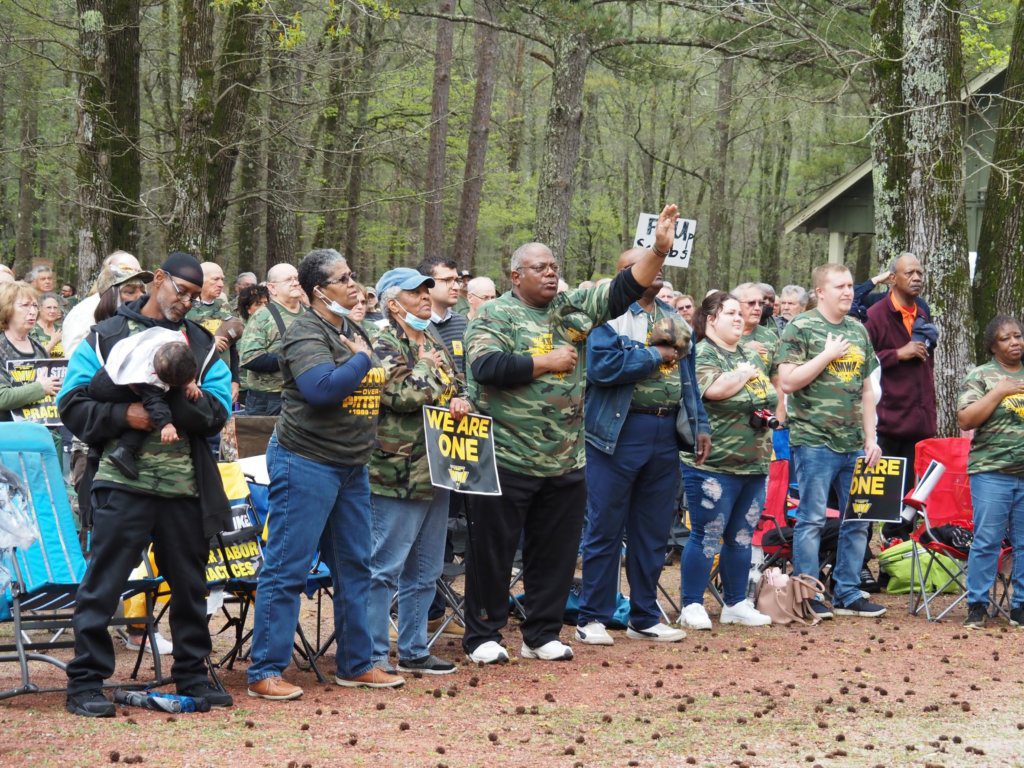
As attendees trickled in, I went over to say hello to Danny Whitt, the tall, bearded recording secretary for West Virginia’s storied UMWA Local 1440. We’d first met in historic Matewan, during the Blair Mountain Centennial last year. He greeted me with a smile and told me that he’s hoping I’ll be able to come back down to see them soon. Whitt and his fellow officers in 1440 (as well as many other UMWA retirees) have been working overtime to amplify the story of their ongoing battle over black lung benefits, a now decades-long crusade against a brutal respiratory disease, cadres of penny-pinching coal bosses, and a federal government that seems to have forgotten their struggle. I promised I’d do what I could, then I told him why their fight felt so personal to me. In 2020, my grandfather died after a short and brutal scrap with lung cancer; the official diagnosis was mesothelioma, a rare, aggressive disease caused by exposure to asbestos. He’d spent forty years working in a steel mill, breathing in dust and fibers and god knows what else, and it finally caught up to him right around his 82nd birthday. He was my favorite person.
Whitt, his eyes kind, nodded in recognition. “White lung.”
My heart skipped a beat. I’d never heard that name for it before, but hearing those words instantly deepened my connection with a group of workers with whom I’d already developed such a kinship. While my granddad was breathing in poison in New Jersey, workers from his same generation were choking on dust in underground Appalachian coal mines; as their lungs blackened (and his whitened), garment workers in cotton mills across the country were falling victim to byssinosis—brown lung. A whole rainbow of pain, generations of workers felled by tiny specks of dust and fiber that should never have been there at all, suffocated by deadly debris in the recycled air.
So much of that pain is buried with the generations of workers who bore it, their lives extinguished like so many lamplights even as their descendants head back down into the mines for another 12-hour shift—and another daily gamble with their own health. Those names will never appear in a history book, but the impact that they and their labor has had is incalculable, and the suffering they endured should not be forgotten. Whitt, himself a retired miner and current black lung patient, was only one of a thousand other miners who had shown up that day to support their striking siblings, but every one of those workers’ stories—and lives—has a place in labor history, and in the centuries-old fight against the ravages of capitalism.
That history was alive on April 6.
The lineup of speakers was stacked with union officials, pastors, and regional leaders. The presidents of the Alabama AFL-CIO, Kentucky AFL-CIO, and Virginia AFL-CIO spoke in support of the strikers; so did American Federation of Teachers (AFT) Secretary-Treasurer Fedrick Ingram, and Anthony Shelton, international president of the Bakery, Confectionery, Tobacco Workers, and Grain Millers Union (BCTGM), who spoke about the support the UMWA had shown his members during their own grueling strike. Sara Nelson, international president of the Association of Flight Attendants-CWA, was a crowd favorite, as usual. Nelson has been one of the strike’s most visible and dedicated supporters—she’s been back down to Alabama as many times as I have to show support and add a little of her patented fire to rally stages. We shared a ride to the rally, and as soon as we arrived, people flocked to her; at one point, I took on the role of unofficial photographer because so many people wanted photos with Sara. During a year-long strike in which mainstream recognition (to say nothing of support) has been hard to find, Nelson’s commitment to showing up for the miners has clearly made an impact. Speaking to the crowd, she drew a direct line between the work her members do 20,000 feet in the air and what the miners do 2,000 feet underground and made a timely point: both breathe recycled air, and that air is only safe because of how hard the unions have fought to make it so.
On the ride over, UMWA International Secretary-Treasurer Brian Sanson had good-naturedly grumbled about having to follow a firecracker like Nelson to the stage. But as I told him then—and will tell you now—the tall, gruff, affable union man has become quite a dynamic public speaker over the past year, and his rhetorical style can be especially electrifying when he’s calling the bosses on their bullshit or castigating do-nothing Republican politicians for abandoning their constituents.
The skies had darkened and the air had grown heavy by the time Cecil Roberts bounded onstage, but, miraculously, save for a few stray drizzles, the promised rain never came. At several points during his speech, the clouds opened up and rays of sunshine illuminated the stage. I’m not a religious person, but that moment almost made a believer out of me.
Last week I went back to Alabama for a massive @MineWorkers rally to commemorate the one-year mark of the #WarriorMetCoal strike. Greg Pilkerton, a miner who’s been holding the line for over a year now and was injured by company goons, told me that they’ll never give up the fight pic.twitter.com/Y7N8zWtcXW
— Kim “FIGHT LIKE HELL📕Out April 26!”Kelly (@GrimKim) April 13, 2022
To watch Cecil Roberts speak is a near-religious experience; his voice rises, falls, and growls with the fervor of an old-time mountain preacher. When he gets fired up—and he’s always just a hair away from getting fired up—you can almost feel the passion of history pouring out of him like light, from his ancestors Bill and Ma Blizzard, who waged war on King Coal during the Battle of Blair Mountain, to the thousands of coal miners he’s fought for and alongside during his long career in labor. Roberts, a former miner himself, came up through the rank and file, and it shows; at one point, as drops had begun to fall, he joked that no one there was afraid of rain since they were so used to getting wet underground. The major concern was making sure that they could get the buses—and hundreds of retirees, some of them unsteady on their feet—out safely. Luckily, the rain took its time getting to McCalla, and the rally went off without a hitch.
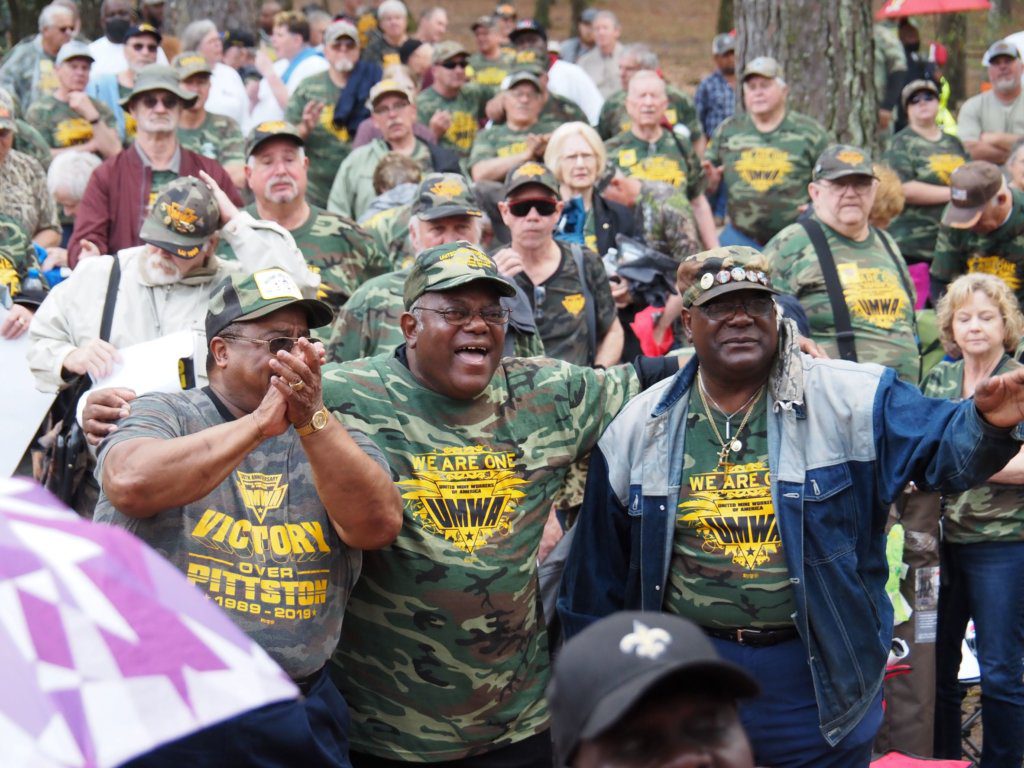 It was a really lovely affair, suffused with the familial quality that is so common at UMWA events and bolstered by the appearance of the strikers’ many supporters. I’ve lost count of how many of these rallies I’ve attended by now. My coverage of this story has taken me to McCalla, to New York City—where the miners rallied in front of BlackRock, calling on Warrior Met’s majority shareholders to force the bosses to the table—and to Washington, DC, where I sat in on a Senate hearing held by Sen. Bernie Sanders and Sen. Elizabeth Warren to address the impact of private equity greed on the American working class. Braxton Wright, a striking miner and current Amazon worker, spoke during the hearing, and his testimony was heartfelt and wrenching. When Alabama Sen. Tommy Tuberville, an Arkansas-born former football coach and current corporate lapdog and insurrectionist, took his turn at the mic, he spoke in favor of the company, parroting anti-worker talking points that might as well have been scribbled by Warrior Met’s own executives. The contrast was jarring. When Tuberville stopped to try to speak with Braxton afterwards, Wright’s wife Haeden hissed, “Don’t you shake his hand!” Chastened, Tuberville and his staff turned tail and slunk out. Through my year of covering this strike from as close to the inside as a South Philly muckraker can get, that was the first and only time I saw an Alabama GOP politician acknowledge the strike—or the coal miners themselves.
It was a really lovely affair, suffused with the familial quality that is so common at UMWA events and bolstered by the appearance of the strikers’ many supporters. I’ve lost count of how many of these rallies I’ve attended by now. My coverage of this story has taken me to McCalla, to New York City—where the miners rallied in front of BlackRock, calling on Warrior Met’s majority shareholders to force the bosses to the table—and to Washington, DC, where I sat in on a Senate hearing held by Sen. Bernie Sanders and Sen. Elizabeth Warren to address the impact of private equity greed on the American working class. Braxton Wright, a striking miner and current Amazon worker, spoke during the hearing, and his testimony was heartfelt and wrenching. When Alabama Sen. Tommy Tuberville, an Arkansas-born former football coach and current corporate lapdog and insurrectionist, took his turn at the mic, he spoke in favor of the company, parroting anti-worker talking points that might as well have been scribbled by Warrior Met’s own executives. The contrast was jarring. When Tuberville stopped to try to speak with Braxton afterwards, Wright’s wife Haeden hissed, “Don’t you shake his hand!” Chastened, Tuberville and his staff turned tail and slunk out. Through my year of covering this strike from as close to the inside as a South Philly muckraker can get, that was the first and only time I saw an Alabama GOP politician acknowledge the strike—or the coal miners themselves. 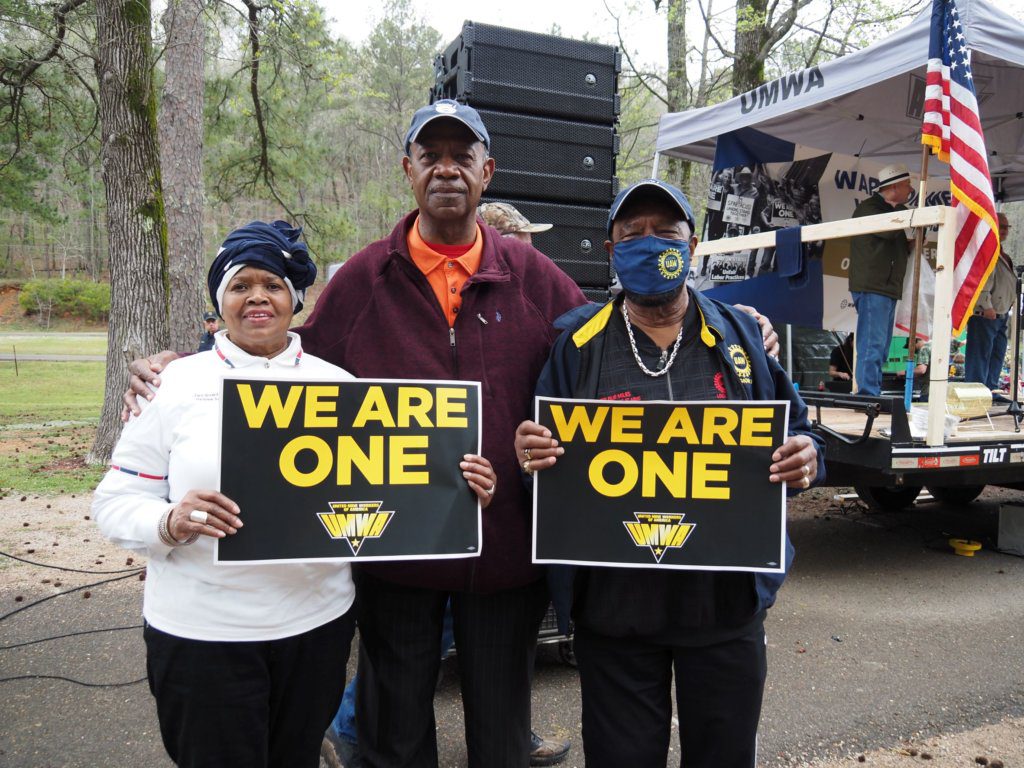
I’ve long wondered at how little press the Warrior Met Coal strike has gotten over the past year. While that has thankfully begun to change, it still burns me up that this fascinating, complicated labor story that involves thousands of multiracal, multigender, multigenerational, rural, blue-collar union workers and their families, who all have nuanced and sometimes conflicting social, political, and cultural experiences, has largely been ignored outside of the labor press and the occasional bigger-league article or feature. I’ve done my damnedest to give it as much coverage as I can everywhere I can—from right here on The Real News to Elle Magazine—but that’s been tough too. I’ve spent the past year ping-ponging between Alabama and my little house a few blocks off Broad Street, where I’ve been holed up writing my first book, FIGHT LIKE HELL: The Untold History of American Labor. Digging through 300 years of working-class history while trying to keep abreast of every minute development in the strike consumed every waking hour and cemented my commitment to this strike and these workers. It’s always been personal, but now the two will forever be entwined in my memory. FIGHT LIKE HELL wouldn’t have been the same without them.
When I turned in the final edits, the strike was in its tenth month, and I’d fervently hoped to end the book with news of their victory. Instead, the strike goes on, and the miners continue to march. My sources have become my friends; Haeden, president of the local UMWA Auxiliary, soon-to-be local Democratic official, and the first person who would consider talking to me on record, is basically my sister. All I want is for my friends to be happy, and healthy, and to win this damn thing. There is no happy ending just yet, or even a messy and unsatisfying one; right now, the only certainty is that it won’t be over until it’s over. (And at this rate, I’m going to have to write a whole new book entirely about the strike, to make sure the real story gets out there).
Last week I went back to Alabama for a massive @MineWorkers rally to commemorate the one-year mark of the #WarriorMetCoal strike. Greg Pilkerton, a miner who’s been holding the line for over a year now and was injured by company goons, told me that they’ll never give up the fight pic.twitter.com/Y7N8zWtcXW
— Kim “FIGHT LIKE HELL📕Out April 26!”Kelly (@GrimKim) April 13, 2022
When I spoke to striking miner Greg Pilkerton after the rally, he wasn’t shy about expressing himself, telling me how badly he just wants to get back to work. A year on the picket line is hard enough without considering the endless roadblocks, sabotage, and malfeasance that Warrior Met has thrown their way, and it’s no wonder that these workers are tired; tired of fighting, tired of working second jobs, tired of worrying about bills, tired of being slandered and smeared by a big money PR firm that their bosses hired. Some of them, like Greg and his wife Amy, have been injured by company-enabled violence; others have cut ties with friends or family members who chose to cross the uncrossable picket line. It’s been incredibly difficult every step of the way, but the vast majority of the strikers are still standing, and they’re not giving up now. “Now, we’re almost more dug in,” Haeden Wright told me before we met for dinner with some of the other auxiliary members and their striking family members. “At the beginning, they were like, ‘We’re gonna starve them out in a few weeks, in a few months’… Well, none of us are starving.”
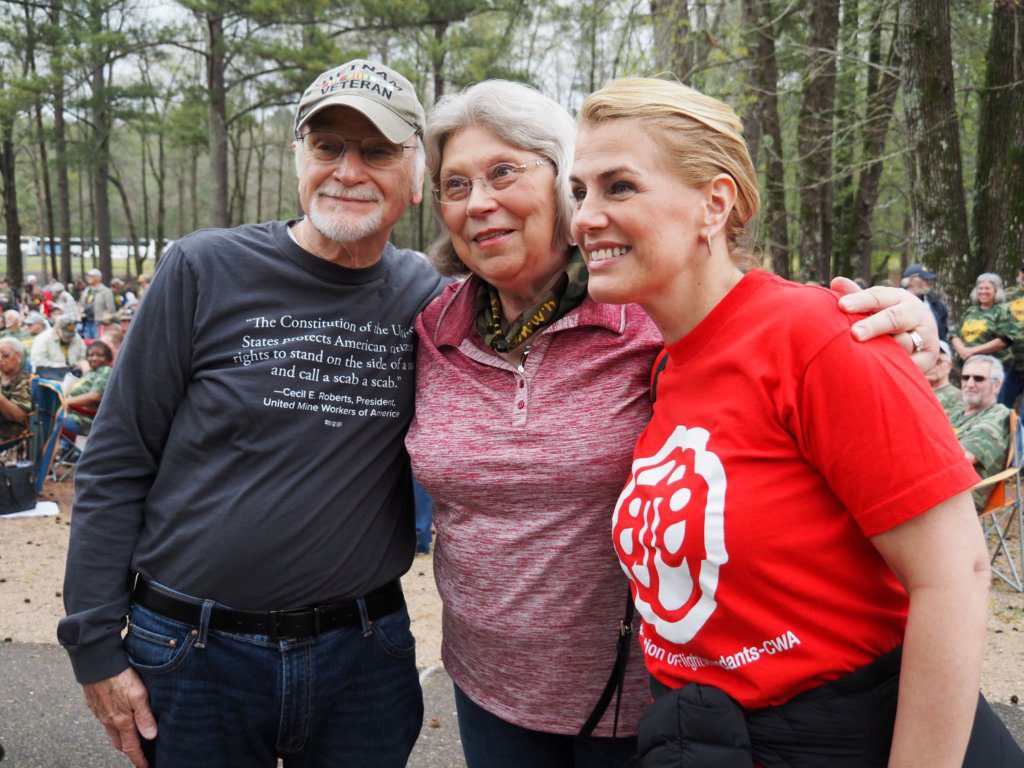
The union’s motto—“one day longer, one day stronger”—has become a mantra for the strike, as well as a manifesto. However long the company wants to drag out the strike by refusing to get serious at the bargaining table, these workers are determined to keep holding the line. As Pilkerton told me, “We ain’t going nowhere.”

